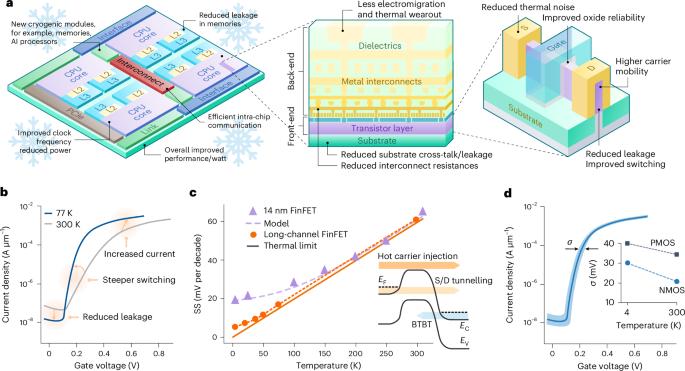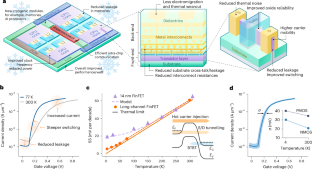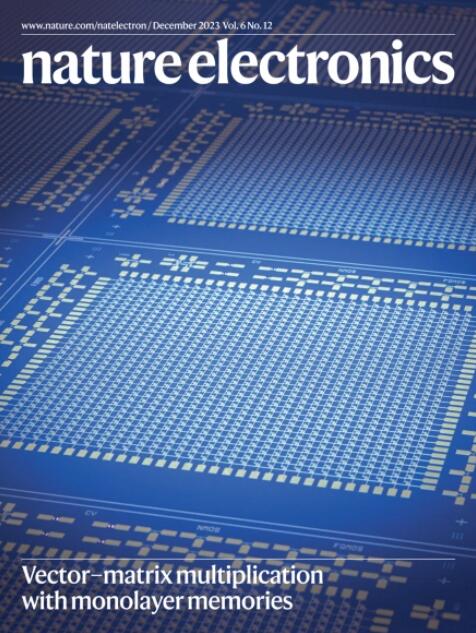Energy-efficient computing at cryogenic temperatures
IF 33.7
1区 工程技术
Q1 ENGINEERING, ELECTRICAL & ELECTRONIC
引用次数: 0
Abstract
Increasing demand for data-intense computing applications—such as artificial intelligence, large language models and high-performance computing—has created a need for computing infrastructure that can handle large workloads with high energy efficiency. Advances in silicon-based complementary metal–oxide–semiconductor technology have led to more efficient field-effect transistors, but these devices are fundamentally limited by thermionic injection. As a result, on–off switching efficiency cannot be improved beyond 60 mV of drive voltage per decade of current. Operation of electronics at cryogenic temperatures, such as 77 K, can overcome this limit and provide performance improvements. Here we explore the development of computing at cryogenic temperatures. We examine the changes in electrical transistor and material properties observed at low temperatures, and highlight the need for further studies on cryogenic noise, reliability, variability and thermal management. We also consider the potential performance improvements at the device and circuit level of such technology. This Perspective examines the performance advantages and challenges of operating complementary metal–oxide–semiconductor (CMOS) devices at cryogenic temperatures.


低温条件下的高能效计算
对数据密集型计算应用(如人工智能、大型语言模型和高性能计算)的需求日益增长,因此需要能够以高能效处理大型工作负载的计算基础设施。硅基互补金属氧化物半导体技术的进步带来了更高效的场效应晶体管,但这些器件从根本上受到热离子注入的限制。因此,通断开关效率无法提高到每十进制电流 60 mV 驱动电压以上。在 77 K 等低温条件下运行电子器件可以克服这一限制,并提高性能。在此,我们将探讨低温计算的发展。我们研究了在低温条件下观察到的电子晶体管和材料特性的变化,并强调了进一步研究低温噪声、可靠性、可变性和热管理的必要性。我们还考虑了此类技术在器件和电路层面的潜在性能改进。
本文章由计算机程序翻译,如有差异,请以英文原文为准。
求助全文
约1分钟内获得全文
求助全文
来源期刊

Nature Electronics
Engineering-Electrical and Electronic Engineering
CiteScore
47.50
自引率
2.30%
发文量
159
期刊介绍:
Nature Electronics is a comprehensive journal that publishes both fundamental and applied research in the field of electronics. It encompasses a wide range of topics, including the study of new phenomena and devices, the design and construction of electronic circuits, and the practical applications of electronics. In addition, the journal explores the commercial and industrial aspects of electronics research.
The primary focus of Nature Electronics is on the development of technology and its potential impact on society. The journal incorporates the contributions of scientists, engineers, and industry professionals, offering a platform for their research findings. Moreover, Nature Electronics provides insightful commentary, thorough reviews, and analysis of the key issues that shape the field, as well as the technologies that are reshaping society.
Like all journals within the prestigious Nature brand, Nature Electronics upholds the highest standards of quality. It maintains a dedicated team of professional editors and follows a fair and rigorous peer-review process. The journal also ensures impeccable copy-editing and production, enabling swift publication. Additionally, Nature Electronics prides itself on its editorial independence, ensuring unbiased and impartial reporting.
In summary, Nature Electronics is a leading journal that publishes cutting-edge research in electronics. With its multidisciplinary approach and commitment to excellence, the journal serves as a valuable resource for scientists, engineers, and industry professionals seeking to stay at the forefront of advancements in the field.
 求助内容:
求助内容: 应助结果提醒方式:
应助结果提醒方式:


